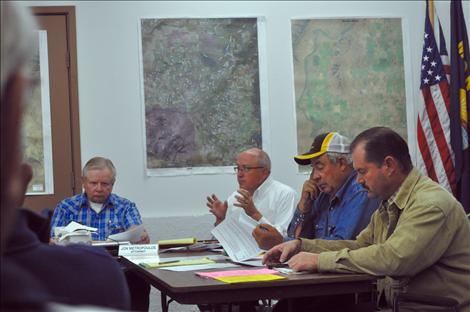FJBC authorizes expert to testify in court case, legislature
Hey savvy news reader! Thanks for choosing local.
You are now reading
2 of 3 free articles.
ST. IGNATIUS — Time and money are short as the Flathead Joint Board of Joint Control tries to prioritize its involvement in four court cases and negotiation of the Confederated Salish and Kootenai Water Compact.
At its Sept. 18 board meeting, the board’s commissioners were divided on whether or not to pay thousands of dollars to an expert set to write key reports and testify in court cases for the board.
“This is a time of austerity for this board in particular,” Board Member Ted Hine said. “We’re out of money. Get real.”
The expert, Ed Evereart of WWC Engineering, has been working since June on testimony that the board’s attorney Jon Metropoulos says is critical in making headway in one of the handful of lawsuits the board is involved in. Evereart is also expected to be a key technical witness in the board’s argument for better negotiation before the state legislature’s Water Policy Interim Committee in October.
Metropoulos said Evereart’s expertise will be used to scrutinize data and modeling systems put forth by hydrological experts of the Confederated Salish and Kootenai Tribes in determining the amount of water available to irrigators in the proposed water compact that is currently under negotiation between the state, federal, and tribal governments. In negotiations state officials have proposed a plan of adaptive management meant to protect irrigators if the Tribes’ modeling data does not pan out as planned, but some board members have remained critical of the model because they believe it will mean irrigators receive significantly less amounts of water than they are entitled to.
If the compact does not pass through the state’s next legislative session set to begin in January, representatives for the Confederated Salish and Kootenai Tribes have said they will file as many as 10,000 water rights claims as far east as Bozeman.
The board has said it would like a compact passed and avoid throwing thousands of claims into court, but not unless key provisions for irrigators are met. The board is currently working on a re-write of what exactly those key provisions are.
Metropoulos said the board has a 30-60 day time slot to have influence in the negotiations. He said he doubts there will be as much relevance given to the board’s concerns about the scientific data used to create the compact unless a credible technical expert such as Evereart is produced.
“My impression is that it is always a time of austerity,” Metropoulos said. “The board always wants its money to be spent well. But there have been a series of choices that have been made by this board which require a higher level of attention from lawyers and various technical experts. Mr. Evereart is one of them. If we’re going to be involved in controversial things that require that much attention from experts and lawyers, they need to be paid. If they are not then you are going to go into these discussions unarmed.”
Board Member Jerry Laskody approved of paying Evereart’s fees, which are projected to catapult past the $20,000 mark the board budgeted to pay for the services.
“I don’t think we can afford not to have this guy as a consultant,” Laskody said.
Hine disagreed, saying the board should try other avenues to evaluate the scientific data.
“You can’t keep spending money and expect this board to keep functioning,” Hine said.
Metropoulos said he was “outta here” if Evereart wasn’t paid.
The board approved paying Evereart up to $20,000.
















